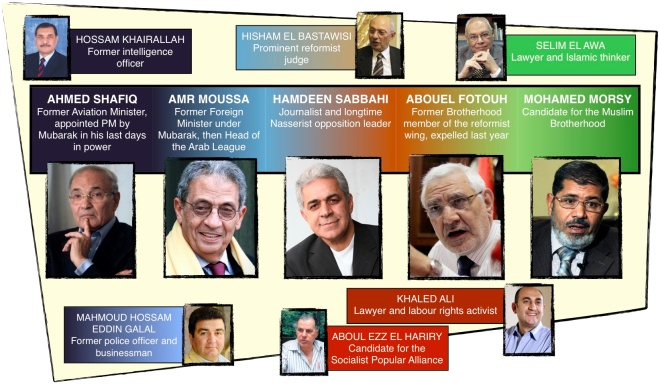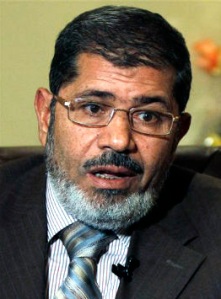Egypt’s first democratic Presidential elections have begun today. 53 million eligible voters are asked to choose between eleven candidates. Only five candidates, however, seem to have a credible possibility of making it to the second turn, which will take place on 16 and 17 June if by tomorrow nobody will have reached an absolute majority of votes.
Polls have been throwing around some contradictory guess-work, but reliable predictions are very hard to make. The Islamist vote will be divided between the Muslim Brotherhood’s candidate Mohamed Morsy and former Brotherhood member Abouel Fotouh. Mohamed Morsy can count on the support of the Brotherhood’s mainstream, the Salafi Jurisprudence Commission for Rights and Reform and Salafi political parties Asala, Fadhila and Islah. Abouel Fotouh can count on the more progressive and revolutionary currents within the Brotherhood and has the support of the moderate Wasat Party, but has also been endorsed by the Salafi Dawah group and its political party Al Nour.
The revolutionary vote is divided mainly between those who are considering voting for Abouel Fotouh and those who support the Nasserist candidate, Hamdeen Sabbahi. Abouel Fotouh has consistently been one of the most outspoken critics of the military council, and has been endorsed by some groups within the Revolutionary Youth Coalition, but others have voiced their opposition. Hamdeen Sabbahi represents the choice of those who fear Abouel Fotouh might indeed still be very close to the Brotherhood, which already controls 40% of Parliament.
The liberal vote is struggling just as much to make up its mind, torn as it is between Amr Moussa and Abouel Fotouh. The Wafd party has thrown its weight behind Amr Moussa, the popular former Foreign Minister who has been leading most polls in the last months. Many, however, see him as a feloul, a “remnant” of Mubarak’s regime. The higher echelons of the Egyptian Social Democratic Party, the Free Egyptians Party and the Adl Party all seemed inclined to back Amr Moussa, but threats of mass resignation from their rank and file convinced them to take a more cautious approach, deciding not to back a particular candidate for the first round of voting.
But the military and counter-revolutionary forces seem to be equally divided on their choice, with former Amr Moussa and Ahmed Shafiq competing for their preference. Until recently, the candidate closest to the military council was thought to be Amr Moussa, a popular statesman distant enough from Mubarak’s regime to be able to claim exemption from its corruption. In the last month, however, Shafiq has stepped into the crowded spotlight and asserted himself as a viable candidate, becoming the frontrunner in two different polls commissioned by government-affiliated pollsters.
The outcome of this first round of voting is bound to blow away all this indecision. When it will be down to two alternatives Egyptians might be disgruntled by the remaining options, but they will most likely have no doubt on what to do with their ballot.
[read more about the individual candidates here]








